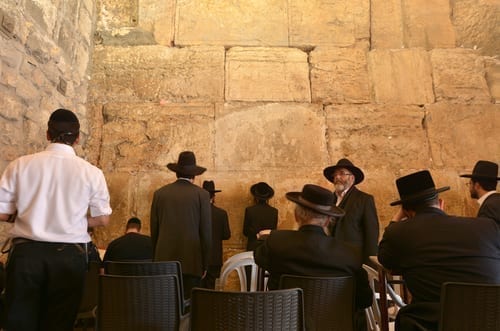This happened exactly 8 years ago. We reverently made our way to the synagogue, and with excitement took our seats. We recited the blessing “to enwrap in a tallit”. Now, we were beginning to feel the awesomeness of the day. It’s here. The other worshippers felt the same.
Slowly the synagogue filled with worshippers. There was another five minutes until the chazan would begin “Lecha Keili T’shukati”. Everyone would soon join in to that refrain announcing that G-d’s angels above have come down to us. It’s the end of the Ten Days of Repentance, the days when we tried to improve ourselves and accept upon ourselves new resolutions, after 40 days of getting up at dawn to say the Selichot penitential prayers. And now we have arrived at the culmination of it all, the great day. The day when we are similar to the ministering angels.
We were dressed in white, pure like snow. In another 24 hours, we would be deep in the Neila prayer, the crowning prayer of this holy day, but right now, as soon as the chazan began the piyyut “Lecha Keili T’shukati”, we returned to the moments when we were welcoming this sublime day, instead of watching it depart.
The chazan began, and we and the rest of the worshippers put the tallit over our heads and began to sing with emotion. Everyone knows the tune. And then a young fellow sat next to me, a white kippah on his head, long hair, with a white shirt, pants and shoes. He politely asked me to open the prayerbook for him and show him the page. In those moments, you ask yourself: should I adopt him this Yom Kippur, should I show him each page and even learn with him a few of the melodies, or should I say “I have to take care of myself. Don’t bother me. I have to focus on myself because I want to feel Yom Kippur instead of let someone else feel Yom Kippur.” Then you suddenly remember that you are in the neighborhood synagogue, and everyone came to pray. It’s a great merit and opportunity for you.
After I decided to “adopt” the fellow, I turned my heard, looked around and realized that at least another 5 worshippers are doing the same. You feel a sense of responsibility. Yes, it’s not a chore, it’s a privilege, maybe a great privilege. Because you know that your every movement is being watched by another pair of eyes. You have to immerse yourself completely in the prayers and teach your new “partner” every word. To explain to him the prayer you say silently and the confessions “We were guilty, we acted treacherously.”
During the Shemoneh Esreh prayer, he followed the instructions. At the conclusion of the night prayers, he asked me at what hour was daybreak so he could come on time when the morning prayers would begin. He arrived the next morning on time. And the same for the afternoon prayer. Since then and until today, we’re in contact with each other, and he is a Jew who now keeps the Torah’s commandments.
* * *
I will never forget this Yom Kippur — not because of Adi, the Jew who sat next to me the entire Yom Kippur — but because of what happened when they began the Kol Nidrei prayers on Yom Kippur night.
We were repeating the prayers after the chazan, feeling in our bones how the gates were beginning to open up before us, when, without prior notice, at the pinnacle of this lofty moment, a mobile phone began to ring. Ugh, how can we continue Kol Nidrei? You look right and left, trying to figure out where that r-i-n-g-i-n-g is coming from.
For a moment, I thought it was Adi’s phone. Maybe he forgot his mobile phone in his pocket, who knows what. But no. He turned colors because everyone was looking at him. He whispered to me, “It’s not me.” I encouraged him, and suggested that it was maybe the phone that some child had taken from his father.
Silence. We got back into Kol Nidrei. Then again that annoying r-i-n-g-i-n-g. This time, we already figured out who had the phone. It wasn’t a child or a toddler. It was a phone ringing in the pocket of a Bukharian fellow from the Caucus who arrived for Kol Nidrei with his friends. He picked up that everyone was staring at him, felt uncomfortable and left the synagogue.
We were shocked. When the Torah scroll was returned to the Holy Ark, all of a sudden we realized that this person may have been a lost soul trying to reconnect to his roots. We felt a pinch in our heart. Why didn’t we encourage another fellow Jew to connect to his Father in heaven?
I learned from Adi at the end of Yom Kippur that this is the greatest day when you can draw more and more Jews to our Father in heaven. They are all coming to taste Yom Kippur. This could be your chance to help another Jew draw close to the Torah.
* * *
Five years ago, a synagogue was founded in our neighborhood which was named Nitzutzei Yisrael (“Jewish Sparks”) after the Baba Sali [Rav Yisrael Abuchatzera]. The synagogue was founded by Rebetzin Simi Abutchatzera and the one who ran it and served as its rabbi was Rabbi Oren Malkah. Whoever entered this synagogue didn’t leave it. It was like a magnet. It had the atmosphere of a family. The rabbi taught Torah ideas that were pertinent, spiced with stories of tzadikim.
Every synagogue is important and has its own flavor, but Nitzutzei Yisrael was unique. One of its worshippers was Yigal. We called him Rav Yigal, he had a large black kippah on his head and he always sat at the side looking into a gemara, a commentary on the weekly Torah portion, the commentary of the Ohr Hachaim, or a book of ethics. He utilized every second to the utmost. He would also ask questions, argue, give the impression that he knows and wants to know even more.
To tell the truth, until the synagogue opened, we didn’t know who he was. The synagogue was adjoining his home. He would say he was completely devoted to G-d.
One Shabbat night when Rabbi Malkah was addressing the worshippers, Yigal didn’t understand him and kept asking him to explain his words. He wanted to understand the Torah. He wanted to fill his huge hole of ignorance.
Sometimes when I passed by his neighborhood at a late hour, such as two hours after midnight, the light was always on in the salon. The light was always on in the home of Yigal the Bukhari, a sign that he was busy with Torah study. He was busy trying to understand a subject in Bava Kama or in the middle of studying Taanit to learn the practical laws. He would research the topic in the Shulchan Aruch, and afterwards would study the Yabia Omer (written by Rabbi Ovadya Yosef, may his merit protect us), and the Yalkut Yosef (by the Rishon Lezion, the present Chief Rabbi Rabbi Yitzchak Yosef) and the Halacha Berura (by the member of the Council of Torah sages, Rabbi David Yosef). In the end, after he had delved to understand the topic, he wanted to know how to keep the practical law.
The truth is that I didn’t know very much about Yigal the Bukharian. Every so often I liked to hear what topics he was grappling with, to try and find an answer. In general, gemara study is sweet when you are confronted with a question and have to turn over the Rishonim and Achronim until you find a satisfying answer.
One Thursday, Rav Oren Malkah invited me to a celebration at his home in honor of his daughter the bride. Yigal was also there with a book in his hand. He was deep in the topic and instead of letting his mind wander, he decided to study.
We washed our hands and sat down to drink a little wine and eat. There was a happy atmosphere in the house, we were rejoicing with a bride and groom and Yigal was also eating and drinking with us. And then… we all became a little tipsy and began to pour forth Torah thoughts and praise for the bride’s father. Each person of course had much to say about Rabbi Malkah, the rabbi of our synagogue.
Then came the turn of Yigal the Bukharian. He began to speak about the synagogue and how much inspiration he gets from it. He also related that his children are studying in a Talmud Torah. Then he began to tell his personal story, which surprised us: “Eight years ago — I became acquainted with Judaism. You know how?” he asked. “In the merit of my mobile phone that rang on Yom Kippur night.”
I started, “What do you mean?”
“Yes, me, Yigal — my mobile phone rang on Kol Nidrei night.”
What? Yes. He was that guy… We were shocked.
Yigal related: “I came to the Ben Ish Chai synagogue to pray on Yom Kippur evening. I knew that one should go to a synagogue on Yom Kippur, so I went with a few friends. Then one of my friends who wanted to pray with us called my phone because he wanted to know where we were. I didn’t know that this was not allowed. I was about to take the phone call, but the eyes of all the worshippers who were looking to see who was holding a mobile phone on the holy day gave me to understand that I had a problem. I put the phone on mute, waited a minute, and then the phone rang again. I was so embarrassed that I left the synagogue.
“On Sukkot, I met Rabbi Avichai Fachima and told him what had happened to me with the phone. He had been praying in the same synagogue and he understood. He explained to me everything from A to Z. About Judaism, about prayers, about the holidays, and a huge amount about the Creator of the universe. What G-d really wants from us, and why He created the world.
“Since then until today, I have been growing in Torah and fear of G-d,” Yigal the Bukharian told us. “Since that Yom Kippur, I have been a kosher Jew. A happy person, because I know the purpose of my life. I feel that I came to the world not just to eat and drink and sleep, but much more than that.”
Yigal, it turns out, didn’t only save himself. He does outreach to many other Bukharian youths. He teaches them about Shabbat, tefillin, prayers and of course how to keep other commandments.
“When I look at myself today, I say that were it not for that phone ringing at the beginning of Yom Kippur during Kol Nidrei, who knows if today I would be a G-d-fearing Jew? Only because of the shock which I felt because everyone was looking at me, did I decide to start learning and understanding. Since then, I discovered Judaism, the light in the Torah, and the only thing I want to do today is to keep finishing the Talmud and learn from G-d’s wellsprings.
“I wish my story would bring at least one Jew to repent.”
“I allow you to reveal my story, but only on one condition: That I can be sure that my story would bring at least one Jew to repent. That it will revive one Jew. Because the only thing I want today is to get close to G-d.”
Yigal immigrated from Bukharia as a young teenager. He didn’t know anything about Judaism, not Shabbat, not Yom Kippur, he just knew he was a Jew. His parents circumcised him, but nothing else.
His story shows how every Jew has a spark in him. You just have to find that spark and set it aflame. Who knows how many Jews like him are living among us?
In our generation it is possible to draw more and more Jews close, particularly because of the revolution for which our great teacher Rabbi Ovadya Yosef laid the ground. His holy words still resound in our ears: We shouldn’t be happy that we saved ourselves. We are Torah students. Each one of us has the ability to bring another Jew close to our Father in heaven. It’s our duty to go from home to home and register more children for Jewish education. It’s our duty and perhaps also our privilege to fulfill Rabbi Yosef’s





